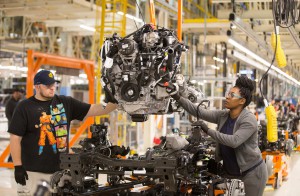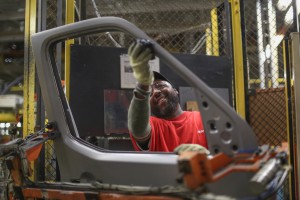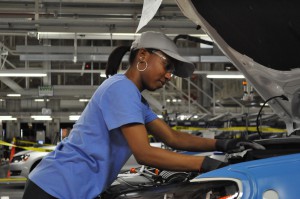
FCA is tapping into part of the $2.2 trillion coronavirus aid package from the federal government to pay unemployment benefits to laid off employees.
Needing to preserve cash in the face of the COVID-19 pandemic, Detroit’s automakers are turning to the federal government to help pay the supplemental unemployment benefits owed blue-collar workers under contracts with United Auto Workers.
European and Asian carmakers, such as Nissan and Volkswagen, also are using the enhanced unemployment benefits Congress approved in its $2.2 trillion relief package to address the coronavirus pandemic.
The UAW noted in a social media post for workers employed by Fiat Chrysler Automobiles N.V. that idled workers are eligible for state unemployment benefits. “Therefore, the Federal Pandemic Unemployment Compensation will reduce the company-provided SUB pay,” the post noted referring to supplemental unemployment benefits negotiated by the union to boost state unemployment benefits paid union members on layoff.
(Toyota extends shutdown while Tesla, Nissan, others launch unpaid furloughs.)
Instead, the money paid unemployed workers between April 4 and July 25, will come from FPUC and the companion Coronavirus Aid Relief and Economic Security Act, rather than the UAW’s negotiated SUB fund, according to the post.

Hourly workers at Nissan’s Canton, Mississippi plant are on furlough with some of their benefits being paid using the new federal assistance package.
The SUB provisions in the UAW’s contract with Ford Motor Co. and General Motors Co. are virtually identical and they also would be eligible for money from the special pandemic aid approved by Congress and the Trump administration rather than using their own funds to pay contractual benefits owed to union members.
Nissan also has announced plans to lay off 10,000 hourly workers, making them eligible for unemployment benefits in Tennessee and Mississippi. The layoffs reverse Nissan’s long-standing policy of avoiding laying off of blue-collar workers.
Volkswagen of America acknowledged it was using the pandemic relief.
“Our primary objective is to protect the financial health of Volkswagen for the benefit of our team as we address the emerging and ongoing impacts of the COVID-19 outbreak on our industry,” said Tom du Plessis, president and CEO of Volkswagen Chattanooga.
(Plummeting auto sales causing inventories, layoffs to rise.)
“Right now, we have limited visibility on when we will be able to resume production, but we are committed to doing everything we can to preserve jobs. During this time, we will be intensely focused on starting to reopen in a responsible way, ensuring our team has the opportunity to return to work safely and as quickly as practicable,” he said.

Volkswagen’s hourly workers at its Chattanooga, Tennessee plant are also on unemployment during the site’s shutdown period.
Volkswagen is taking steps to limit the furlough’s impact on employees, which is expected to last no more than four weeks. During this time, the company said it will continue to provide health care benefits and coverage of premiums, paying both employer and employee contributions. Employees will still receive their first quarter bonuses as well as their March monthly bonuses.
With the recent enhancement of unemployment benefits under the CARES Act, these employees are now eligible to receive an additional $600 per week in federal compensation through the $2 trillion economic stimulus bill, as well as state unemployment benefits.
All furloughed employees will remain Volkswagen employees through the duration of the furlough period. Upon return, employees will retain their original dates of hire and accrued paid time off.
Non-furloughed employees will continue working from home and will use one mandatory vacation day next week. All employees have been asked to self-quarantine and maintain social distancing as directed by the Centers for Disease Control and Prevention.
(Pandemic will have “a permanent effect” on auto industry.)
The factory suspended production last month prior to stay-at-home mandates from state and local government out of an abundance of caution. Volkswagen employees and production contractors received full pay and benefits during this time, for a total of three additional weeks of compensation.
